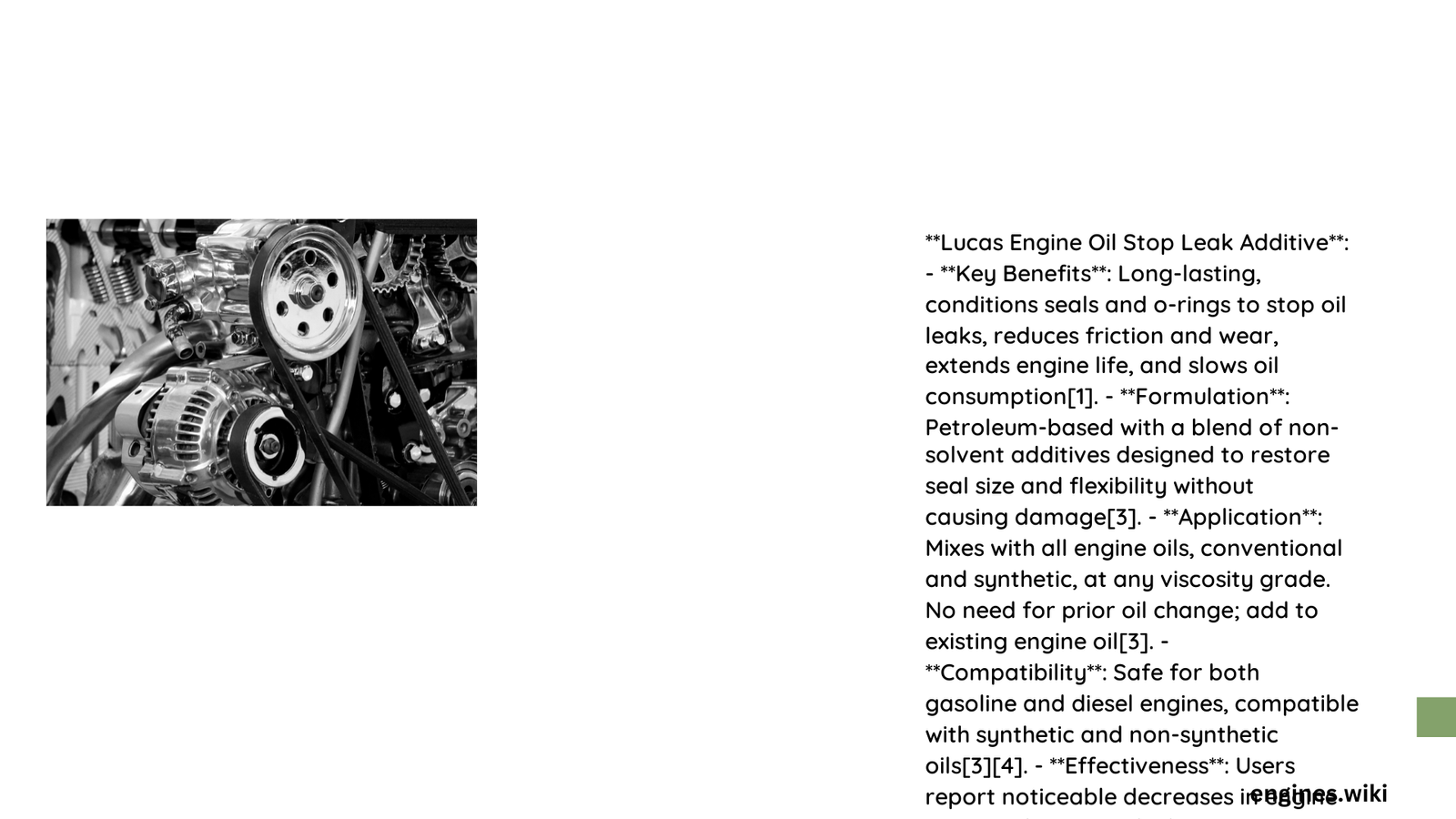Engine oil leaks can be a frustrating and costly problem for vehicle owners. Seal engine oil leak additives offer a potential solution by conditioning and swelling engine seals to prevent and minimize oil leakage. These specialized chemical compounds work to restore seal flexibility, reduce wear, and provide a cost-effective alternative to expensive mechanical repairs.
What Are Seal Engine Oil Leak Additives?
Seal engine oil leak additives are specialized chemical formulations designed to address minor oil leaks by conditioning and rejuvenating engine seals. These products work by:
- Softening and expanding deteriorated rubber seals
- Restoring seal elasticity
- Preventing further oil leakage
- Extending the life of engine seals
How Do Chemical Compositions Impact Seal Performance?
| Chemical Component | Primary Function | Performance Impact |
|---|---|---|
| Organic Phosphates | Seal Conditioning | Improves seal flexibility |
| Aromatic Hydrocarbons | Seal Swelling | Reduces microscopic gaps |
| Viscosity Modifiers | Oil Stability | Maintains consistent lubrication |
What Causes Engine Oil Seal Leaks?

Several factors contribute to engine oil seal deterioration:
- Age and Mileage
- Natural rubber degradation
- Repeated heat cycles
-
Mechanical wear
-
Environmental Conditions
- Extreme temperatures
- Chemical exposure
- High-stress operating environments
When Should You Use Seal Engine Oil Leak Additives?
Recommended application scenarios include:
- Vehicles with 75,000+ miles
- Noticeable minor oil seepage
- Preventative maintenance
- Cost-effective alternative to seal replacement
Recommended Application Techniques
Step-by-Step Process:
1. Check current engine oil level
2. Select appropriate high-mileage additive
3. Warm engine to operating temperature
4. Add recommended quantity
5. Drive 100-200 miles to circulate additive
What Are the Limitations of Seal Engine Oil Leak Additives?
Important Considerations:
– Not suitable for severe mechanical damage
– Temporary solution for minor leaks
– May not work on extremely worn seals
– Performance varies by engine condition
Performance Metrics
| Additive Type | Effectiveness | Temperature Resistance | Cost |
|---|---|---|---|
| Synthetic Conditioners | High | Excellent | $15-$30 |
| Traditional Sealants | Moderate | Limited | $10-$25 |
Expert Recommendations
Professional mechanics suggest:
– Use high-quality additives from reputable manufacturers
– Follow manufacturer’s specific instructions
– Combine with regular maintenance
– Monitor leak progression after application
Cost-Benefit Analysis
Potential Savings:
– Seal replacement: $500-$1,500
– Oil leak additive: $15-$30
– Potential repair prevention: Significant
Conclusion
Seal engine oil leak additives provide a practical, cost-effective solution for managing minor engine oil leaks. While not a permanent fix, they offer vehicle owners an accessible method to extend seal life and prevent more expensive repairs.
Pro Tips
- Always consult vehicle manufacturer guidelines
- Perform regular engine maintenance
- Address leaks promptly to prevent further damage
Reference:
– SAE International
– Society of Automotive Engineers
– Automotive Maintenance Research Center
